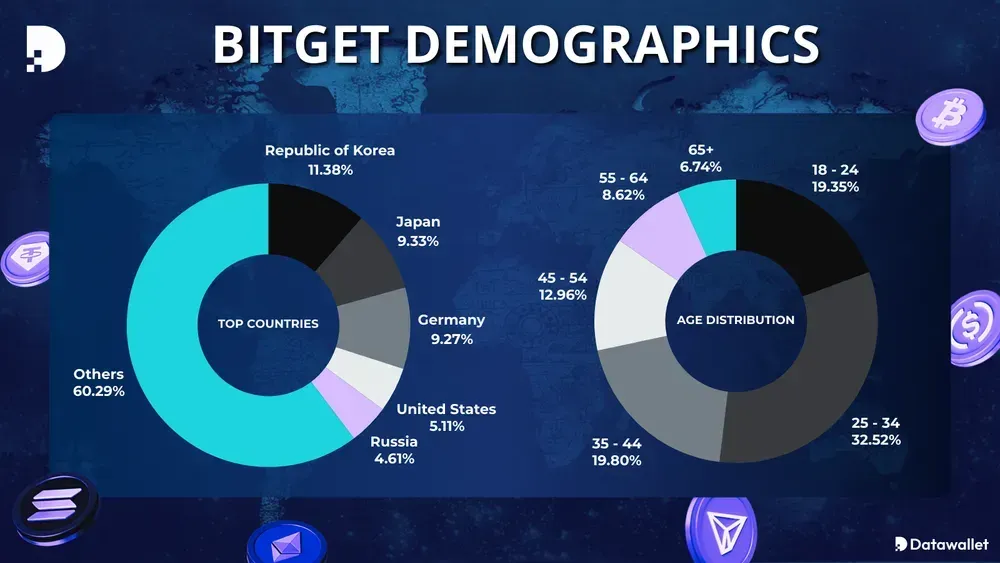Bitget Supported and Restricted Countries

Summary: Bitget has restricted access in certain countries across North America, Europe, and Asia to comply with local regulations until full legal compliance is achieved.
Despite these restrictions, Bitget remains accessible in over 150 countries, enforces KYC verification, and is actively pursuing additional licenses, including DASP in El Salvador and MiCA compliance in Europe.
Bitget is a leading cryptocurrency exchange offering spot, futures, copy trading, yield products, and launchpool services globally, but faces regional restrictions due to regulatory compliance.
Available Assets
800+ Cryptocurrencies
Available Countries
150+ (Banned in USA, Canada, North Korea, Iran, and more)
Regulation & Licensing
MSB License, VASP Registration, BSP License, Pursuing DASP Licensing
Bitget Restricted Countries
Bitget enforces restrictions on users from certain regions due to legal, regulatory, and compliance requirements. The prohibited countries and territories are:
- North America: United States (including territories such as Puerto Rico, U.S. Virgin Islands, and Minor Outlying Islands) and Canada (specifically the Alberta province)
- Europe: The Netherlands, Crimea, Donetsk, Luhansk
- Middle East: Iran, Iraq, Lebanon, Syria, Yemen
- Africa: Sudan, South Sudan, Libya, Central African Republic, Democratic Republic of the Congo, Guinea-Bissau, Somalia
- Asia: Afghanistan, Hong Kong, Singapore, North Korea
- Caribbean & Latin America: Cuba, Haiti
Bitget also prohibits entities on global sanctions lists, including the UN Security Council Sanctions List, the OFAC SDN List, and the U.S. Department of Commerce Denied Persons List. All restrictions are outlined in Bitget’s Terms of Use under Prohibited Countries and Restricted Persons.

What Countries Is Bitget Available?
Bitget serves 45 million users across 150+ countries and regions, supporting over 140 fiat currencies, including USD, EUR, AUD, CAD, CZK, DKK, and others.
According to Similarweb data, Bitget sees 20.6 million monthly visits, with the highest engagement from South Korea (11.38%), Japan (9.33%), Germany (9.27%), the U.S. (5.11%), and Russia (4.61%), while other regions contribute 60.29%.

Bitget Licensing and Regulation
Bitget operates under various international regulatory frameworks, holding key licenses that authorize its crypto trading services in multiple regions, with efforts to expand in 15+ additional markets.
Key Licenses and Registrations:
- United States: MSB License from Financial Crimes Enforcement Network (FinCEN), authorizing money transmission and foreign exchange services.
- Australia: Registered with AUSTRAC, ensuring compliance with AML (Anti-Money Laundering) regulations for secure crypto transactions.
- Italy: Registered with the OAM, meeting legal requirements to operate as a virtual currency service provider under Italian law.
- Poland: Registered as a Virtual Asset Service Provider (VASP), ensuring compliance with European Union financial regulations.
- Lithuania: Crypto-registered, legally offering digital asset services under local laws.
- El Salvador: BSP License from El Salvador’s Central Reserve Bank, enabling Bitcoin-to-fiat exchanges, custody, and payments.
- United Kingdom: Approved under Archax, allowing users to access crypto trading, custody services, and tokenized real-world assets.
- Future Expansion: Pursuing Digital Asset Service Provider (DASP) licensing in El Salvador, Markets in Crypto-Assets (MiCA) compliance in the EU.
Does Bitget Require KYC?
Yes, Bitget requires KYC verification to access its full range of services. As of January 1, 2024, KYC is mandatory for crypto and fiat deposits, P2P trading, and all trading activities. Users must submit a government-issued ID, a selfie, and required documents for identity verification.
Verified users gain higher withdrawal limits (up to 15 million USDT for VIP tiers), advanced trading options, and exclusive promotions. The verification process typically takes one hour, with a maximum review time of four hours. You also get 5 attempts every 24 hours.

Can I Use Bitget in the USA?
Bitget is not available in the United States due to regulatory restrictions. In mid-2023, all existing U.S. users were required to withdraw their assets and close accounts as part of compliance measures.
Even with a VPN, signing up or trading is nearly impossible; our analyst tested this and had the account quickly blocked. Other users report that even if they bypass registration, trading remains restricted, and withdrawals may be frozen.
About Bitget
Bitget, founded in 2018, is a leading crypto exchange and the largest copy trading platform. It offers spot trading, futures with leverage up to 125x, yield products, and a launchpool. The exchange's BGB utility token has an 8 billion market cap, supported by a buyback and burn plan.
With a team of 1,500+ professionals across 60+ countries, Bitget provides access to 800+ assets for spot trading. The platform upholds over 100% Proof-of-Reserves, publishing Merkle Tree proofs and wallet snapshots monthly, ensuring full transparency for BTC, ETH, USDT, and USDC.

Final Thoughts
Bitget is available in 150+ countries but is restricted in the United States, Canada, and other restricted regions due to regulations. KYC verification is mandatory for full platform access and compliance.
It continues expanding globally while working toward MiCA compliance in the EU and a DASP license in El Salvador to raise accessibility and regulatory alignment.

Written by
Antony Bianco
Head of Research
Antony Bianco, co-founder of Datawallet, is a DeFi expert and active member of the Ethereum community who assist in zero-knowledge proof research for layer 2's. With a Master’s in Computer Science, he has made significant contributions to the crypto ecosystem, working with various DAOs on-chain.

.webp)


.webp)




